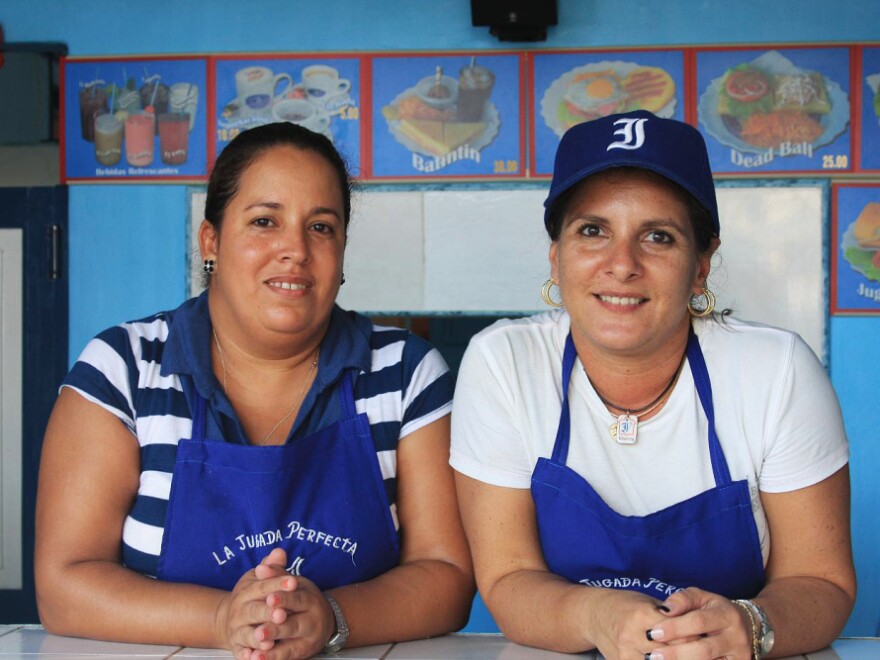Since Cuba's communist government loosened its grip on the economy, thousands of small private businesses have sprung up.
It's a new frontier for budding capitalists, but competition is fierce and advertising is still tightly restricted.
Snack bars and food stalls are now all over Havana, but there aren't many as distinctive as Tio Tito, or Uncle Tito. The first thing you notice is the uniformed employees, scrambling to serve up Hawaiian pizzas and fruit drinks as music videos play on a monitor behind the counter.
The napkins and the to-go containers carry the Tio Tito company logo, and there's even a slick website, which is hosted abroad. The red-and-gold color scheme is no coincidence either, says proprietor and would-be Cuban fast-food king Ivan Garcia. If those colors can work for McDonald's, he says, they just might work for him.
"Those are the colors that stimulate the appetite," Garcia says. "I didn't make that up, it's what the research shows."
Garcia's business is one of only two start-up food stands to make it in his Havana neighborhood. Six others have already gone under since last fall, when President Raul Castro let more Cubans go into business for themselves.

Competing With The Government
These days it's no longer enough to hang a sign outside and sell sandwiches and coffee out the front door. Ismael Bello, another Havana entrepreneur, says the city has too many vendors trying to sell the same things, so he's trying something different.
With a new copy machine brought in from abroad, Bello and his family have started a printing and copy service called Avana, with an attractive, freshly painted storefront. He's competing directly with the Cuban government, setting prices at half of what state-owned copy shops charge.
"In five years, we could be a pretty big company," Bello says. "Next month we'll have our website, and if we keep adding products and services, we can grow."
It's not clear how big Cuban authorities will let these new businesses get as they try to build their brands and open new locations. The government's political messages and propaganda must now compete with more and more commercial signage, but advertising is still essentially banned.
So Cubans like Yanet Alvarez have found other ways to stand out. Her baseball-themed snack bar, the Perfect Play, is quickly becoming famous among fans of Havana's beloved team, the Industriales, attracting crowds to her converted garage.
Everything on the menu is named for something in the game, including a few rather unappetizing-sounding dishes like the Dead Ball and the Squeeze Play. But after toiling for years in drab state-run restaurants, Alvarez says it's exhilarating to be making her own business decisions.
"If a customer orders a sandwich, you have the freedom to say, 'Sure, I'll make it however you want it,' " Alvarez says.
That kind of choice is something of a novel concept in a country where nearly everyone still gets an identical government food ration. And the have-it-your-way ethos isn't the only formula being copied.
One new Havana establishment is calling itself Burger Rey — rey means "king" in Spanish. For now, with the U.S. embargo still firmly in place and no Whoppers to compete with, the market is wide open.
Copyright 2021 NPR. To see more, visit https://www.npr.org.



